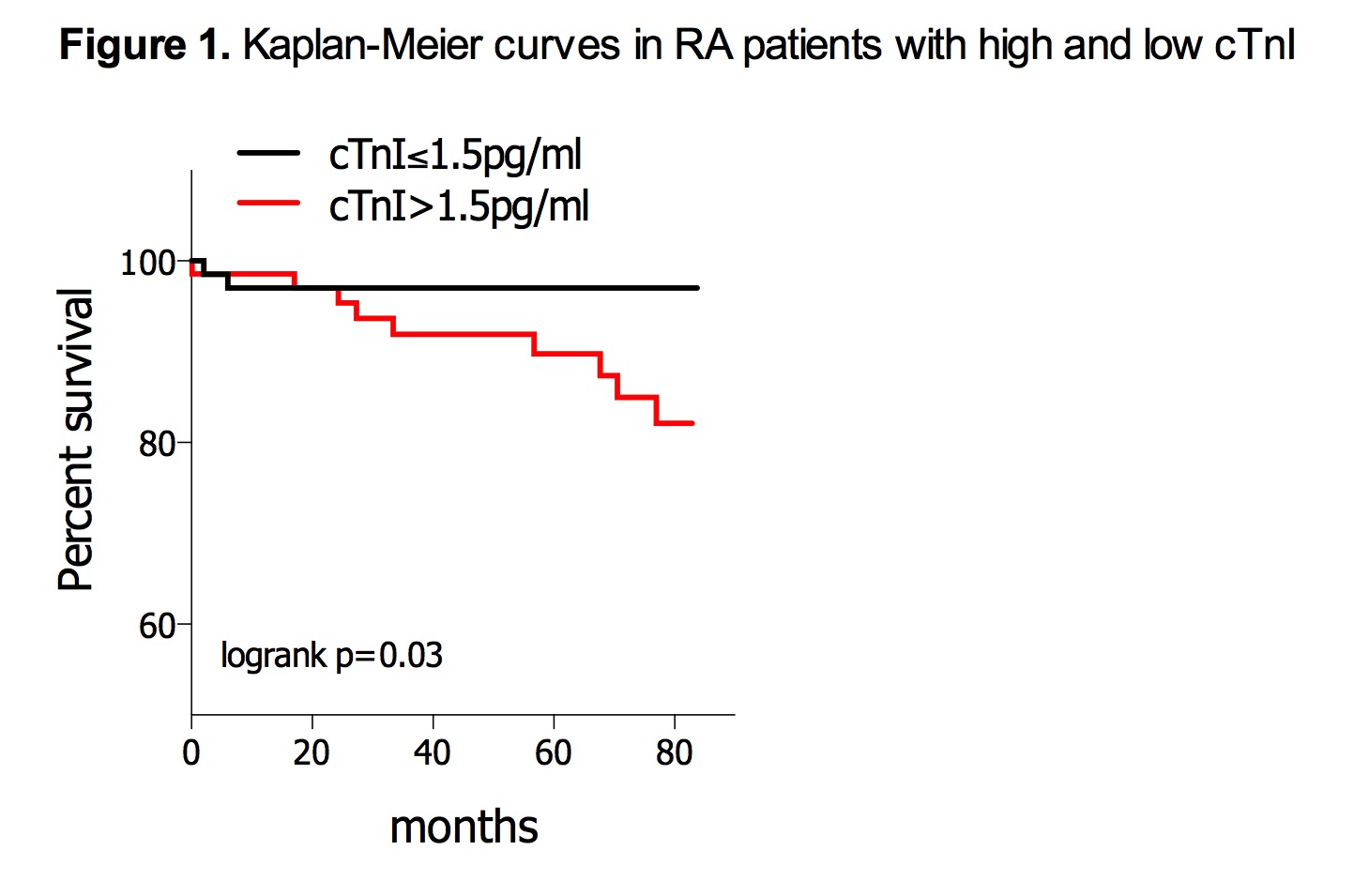Session Information
Date: Sunday, November 5, 2017
Title: Rheumatoid Arthritis – Clinical Aspects I: Cardiac Comorbidities
Session Type: ACR Concurrent Abstract Session
Session Time: 2:30PM-4:00PM
Background/Purpose: Cardiac troponins (cTn) are specific biomarkers of myocardial injury; their measurement with highly-sensitive assays and at subthreshold levels for myocardial infarction (MI) diagnosis, predicts greater risk of both fatal and non-fatal coronary heart disease, heart failure hospitalization, and overall mortality in the general population. We previously reported that highly-sensitive cardiac troponin-I (cTnI>1.5pg/ml), independently predicted occult coronary plaque burden and composition on coronary computed tomography angiography (CTA) in patients with established rheumatoid arthritis (RA). We now explore whether high cTnI predicts cardiovascular events in the same cohort after five years of follow-up.
Methods: One hundred and fifty RA patients without prior diagnosis of cardiovascular disease (CVD) underwent a baseline 64-slice CTA for plaque evaluation between 3/2010-3/2011. Blood was collected for cTnI and other biomarker assessments at the time of the CTA. Subjects were followed for a mean of 60±26 months for incident CV events. Composite rates of ischemic [cardiac death, non-fatal MI, ischemic stroke, peripheral arterial ischemia] as well as non-ischemic [new onset heart failure hospitalization] CV events were the study end-points. Cox regression analysis evaluated the association between high cTnI (>1.5pg/ml) and CV events in raw and several adjusted models; hazards ratios (HR) were calculated as an estimate of CV event risk associated with high cTnI.
Results: Eleven patients suffered incident events (1.54/100PY): 8 were ischemic, including 1 cardiac death, 3 MI, 2 strokes, and 2 peripheral arterial ischemic events requiring emergent revascularizations; the 3 non-ischemic events were new onset, hospitalized, systolic heart failure. cTnI was higher in patients with events compared to those without [2.6 (2.1-4.4) vs. 1.5 (1.0-2.4) pg/ml, p=0.006]. High cTnI predicted risk of incident CV events (Figure 1, p=0.03) independently of demographic and traditional cardiac risk factors (Table 1). Additionally, patients with low cTnI (=<1.5pg/ml) were 82% less likely to suffer a CV event. No events occurred in patients with both low cTnI and low interleukin-6 (=<2.85pg/ml).
Conclusion: Highly-sensitive cTnI may provide prognostic information on long-term CV event risk assessment in RA patients without symptoms or known history of CV disease.
To cite this abstract in AMA style:
Karpouzas G, Estis J, Pham L, Todd J, Budoff M. Highly Sensitive Cardiac Troponin-I in Peripheral Blood Predicts Cardiovascular Events in Patients with Rheumatoid Arthritis [abstract]. Arthritis Rheumatol. 2017; 69 (suppl 10). https://acrabstracts.org/abstract/highly-sensitive-cardiac-troponin-i-in-peripheral-blood-predicts-cardiovascular-events-in-patients-with-rheumatoid-arthritis/. Accessed .« Back to 2017 ACR/ARHP Annual Meeting
ACR Meeting Abstracts - https://acrabstracts.org/abstract/highly-sensitive-cardiac-troponin-i-in-peripheral-blood-predicts-cardiovascular-events-in-patients-with-rheumatoid-arthritis/


